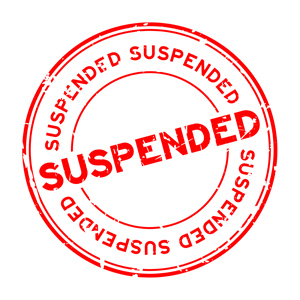Lawyer who sued Trump business associate is suspended for 'campaign to extort a settlement' and judicial insults

Image from Shutterstock.com.
A New York lawyer has received a one-year suspension for allegedly trying to “extort” a settlement using improperly obtained materials in a suit against a former business associate of Donald Trump.
The lawyer, Frederick M. Oberlander, also engaged in “relentless insults and attacks” against two judges and the 2nd U.S. Circuit Court of Appeals at New York in multiple court filings, according to the Sept. 11 opinion by the Appellate Division’s 2nd Judicial Department of the New York State Supreme Court. The decision was covered by Law360, Bloomberg Law, the New York Law Journal and the Legal Profession Blog.
Oberlander had sued Felix Sater, a former unpaid business consultant to the Trump Organization said to have backed a Trump Tower in Moscow. Oberlander’s suit was unrelated to Trump; rather, it claimed that Sater was involved in a RICO conspiracy involving money laundering, embezzlement and fraud after he joined a real estate development firm called the Bayrock Group.
A fired employee at Bayrock had turned over documents from Bayrock’s servers to Oberlander, including sealed materials about a cooperation agreement Sater reached with the federal government in 1998. The agreement was related to Sater’s guilty plea to a RICO violation in connection with his past work for a brokerage firm.
Oberlander had attached portions of the sealed documents to his suit against Sater and included information from the documents about Sater’s cooperation, the New York appeals court said.
Oberlander’s filing revealed that Sater had provided information about organized crime as part of his cooperation agreement, according to the New York appeals court. When U.S. District Judge I. Leo Glasser enjoined Oberlander from disseminating a sealed presentence report, Oberlander filed a signed declaration accusing the judge of presiding over a “star chamber.”
Oberlander’s declaration also accused Glasser of maintaining “a constitutionally illegal super-sealed docket system of private justice.”
Despite Glasser’s order, Oberlander threatened to reveal the sealed information if Sater did not agree to a monetary settlement, the New York appeals court said.
The 2nd Circuit refused to allow Oberlander to release the sealed information, spurring Oberlander to accuse the appeals court of “giving ‘its backhand to the Constitution,’ ” the appeals court said, citing conclusions of a federal court grievance committee. Oberlander also criticized a second federal judge involved in the case, accusing him of “maintaining an inaccurate docket.”
The New York appeals court concluded that Oberlander committed professional misconduct through “relentless insults and attacks” against judges in court filings and through “his campaign to extort a settlement using improperly obtained materials.”
A report by BuzzFeed News said Sater’s cooperation with the federal government extended beyond organized crime. According to a 2009 government sentencing document released by Glasser in August, Sater also provided information to the government about Osama bin Laden’s whereabouts after the Sept. 11 terrorist attacks and what were thought to be his satellite telephone numbers.
He also revealed the whereabouts of Taliban leader Mullah Omar, details of an assassination plot against President George W. Bush, and information on North Korea’s nuclear capabilities, the sentencing document said.
Glasser released the document in response to a lawsuit by the Intercept.
Oberlander’s one-year suspension continues until further order of the court, the appeals court said. It follows a parallel federal court suspension in 2018 by the Eastern District of New York.
Oberlander told the New York Law Journal that he disagreed with the suspension decision and was considering his legal options. He told the ABA Journal on Oct. 4 that the federal suspension never took effect because of a stay pending reconsideration, and the state suspension has also been stayed.
Story updated on Oct. 4 to include information from Oberlander.



